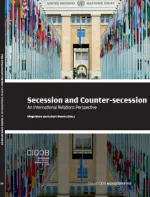Prologue. Secession and Counter-secession

The political debate in Catalonia has been dominated by the issue of political independence in the last few years. The debate on whether Catalonia can (or should) seek statehood has largely been focused on domestic politics. Conversations have ranged from identifying the drivers of the pro-independence movement, analysing the attempts of the Catalan government to hold a referendum and declare independence unilaterally, as well as examining the responses from the Rajoy executive and other state institutions. In the absence of a binding referendum and an informative campaign, Catalan citizens have not been able to collectively discuss the advantages and disadvantages of leaving Spain vis-à-vis the status quo.
CIDOB has taken the step of participating in the public debate on “secession and counter-secession” with a contribution from the field of International Relations (IR). Not only because the tools of IR are natural to our think tank but also due to the fact that the external dimension has been the most neglected in Catalan and Spanish debates. It is important to note, however, that the role of CIDOB as an autonomous institution is not to take a political stance on domestic politics or advise elected officials on what to do each step of the way. CIDOB’s mission is to inform the citizenry of ongoing debates and issues in international affairs as well as providing the public institutions that make up our Board of Patrons with the evidence they need to make informed decisions.
When requested, we have provided expert advice and will continue to do so in the future. But it is worth noting that CIDOB has not been consulted as much as it might have been by the Board of Patrons on this issue. In spite of this and in honour of intellectual independence, we wanted to make a contribution to the debate. Secessionist and counter-secessionist actors often clash about the “internal legitimacy” of their demands but sometimes neglect the “external legitimacy” in the form of international recognition. When it comes to constituting sovereign statehood, aspiring states need to pay significant attention to the calculations of interest-driven great powers.
Noticeably, the states that matter most for supporting and/or opposing state birth are three permanent members of the UN Security Council: the US, France and the United Kingdom. In addition, secessionist movements within Europe face a different environment to those movements outside the EU, especially when it comes to international recognition. It is worth highlighting the Prodi doctrine which states that any territory that breaks away from an EU member state would be outside the union and would need to re-apply for membership – a process that normally takes many years, even in the absence of vetoes from member countries. In the case of a Catalan unilateral declaration of independence (UDI), a veto from Spain would be likely as well as opposition from other member states that may want to discourage claims to self-determination in their own territories.
Against this backdrop, the goals of this book are to provide high-quality analysis that is neither normative nor prescriptive as well as providing a comparative overview of both secessionist and counter-secessionist movements from the point of view of International Relations. Last but not least, I want to personally thank the authors for sharing their expertise and to Diego Muro and Eckart Woertz for co-editing this outstanding book on secession and counter-secession. The volume is testimony to the need to pay attention to the international system as a community of states and, more specifically, the opportunities and constraints offered by the European Union in the 21st century.